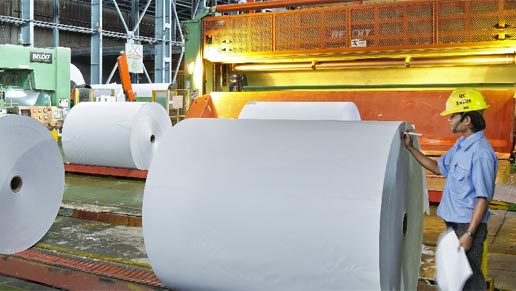
At PaperFIRST we believe in paper, first. Therefore we reproduce here an opinion letter submitted by Liz Wilks, Sustainability Manager for Asia Pulp & Paper (APP) Europe, on how the use of paper can be salutary and beneficial in a stressing workplace environment, and the need for producers to insist on the sustainability of their products to meet their customers’ expectations.
The question of whether screen-time is damaging to our health continues to be hotly debated. Earlier this year University College London and the BMJ Open Medical Journal issued a review of evidence which showed that while there is little proof that screen use can be described as ‘toxic’ to our health, there are clear associations between higher screen use and both obesity and depression.
It seems that in their quest for improved efficiency, businesses have become distracted by new technology, and forgotten that wellbeing is also a crucial part of solving the productivity puzzle.
Research by Deloitte into how workplaces can be designed to achieve digital well-being, shows that the ‘always on’ culture that the advent of technology has brought with it has had a detrimental impact on our efficiency. Technology has eliminated the need for natural breaks during the workday, compromising our ability to maintain attention, and designers have created products that are so focused on prompting us into action, these very same devices are also highly addictive. The constant interruptions provided by notifications spur us to work more quickly and switch tasks rapidly, but also less efficiently due to the constant distractions.
There is a robust body of evidence that taking regular breaks from work improves productivity, but when it comes to screen-time there are even more compelling health benefits. Unison, the UK’s largest public service union, recommends a 5-10 minute screen break or change of activity every hour and BUPA recommends regularly moving away from your computer to avoid ‘computer vision syndrome’.
The answer to this challenge of course lies in balance. Technology has transformed our lives in many fantastic ways, but traditional forms of working should still play a central role. A whitepaper from the University of Nottingham has shown that a pen and paper can encourage creativity with the physical movements involved in writing by hand stimulating children’s brains to a greater degree than typing letters. There is also some evidence to suggest that the process of learning to write has an effect on children’s ability to learn to read. What’s more, the paper refers to a study which shows that college students that took notes in lectures via handwriting could recall more about the lecture than those that took notes on their laptops.
Businesses are rightly challenging themselves to become more sustainable and are increasingly looking to ensure that the paper products meet these challenges too. Significant innovations in the recyclability of paper products should help businesses to reconcile this need.
Of course, it is also important for paper manufacturers to consider the impact of production, as well as the sustainability of the end product. APP’s Sustainability Roadmap Vision 2020, which sets out ambitious targets to improve forest conservation, has come a long way since its introduction in 2012. The vision outlines commitments under 10 key pillars : Climate change, emissions, solid waste, reforestation, conservation & biodiversity, human rights & indigenous people, community empowerment, employee welfare, fibre sourcing and water management. APP has worked with stakeholders including Greenpeace and the Rainforest Alliance to improve the various programmes in place and to track its progress against these goals.
The rise of technology has fundamentally changed the way in which we work, not only in the workplace but also in paper sourcing and production, particularly for APP. Technology in the workplace specifically is allowing us the flexibility to work anywhere and be available 24/7. But there are clear advantages associated with maintaining balance between this and traditional use of paper. APP remains committed to the Office Sector and developing products that enhance working life. The
Enlivo range has been specially designed to fulfil writing and creative needs, whereas Inspira offers a range of professional stationary and notebooks that delight the senses with an elegant look and touch qualities.
With such products still very much in demand and as paper products become more sustainable, we have to question whether paper in the workplace is really declining ? There’s no longer an argument to cut paper-use entirely from the workplace, important or long documents are still often printed out as well as read on screen, note books are still used in meetings. The challenge is, how do businesses strike the balance between a tech-enabled workforce, and employees that are healthy, creative and ultimately, as productive as they can be.
By Liz Wilks, APP

































